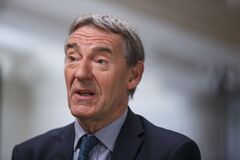Jim O'Neill
Property "Has image" (as page type) with input value "File:Jim_O%27Neill.jpg" contains invalid characters or is incomplete and therefore can cause unexpected results during a query or annotation process.
(economist) | |
|---|---|
 | |
| Born | Terence James O'Neill 17 March 1957 |
| Member of | Chatham House, WHO/Pan-European Commission on Health and Sustainable Development |
Terence James O'Neill, Baron O'Neill of Gatley, is a British economist best known for coining BRIC, the acronym that stands for Brazil, Russia, India, and China — the four once rapidly developing countries that were thought to challenge the global economic power of the developed G7 economies. Jim O'Neill is also a former chairman of Goldman Sachs Asset Management and former Conservative government minister.[1]
Lord Jim O'Neill was appointed Commercial Secretary to the Treasury in the Second Cameron Ministry, a position he held until his resignation on 23 September 2016. He chaired the UK's Independent Review into Antimicrobial Resistance for two years, which completed its work in May 2016. Since 2008, he has written monthly columns for international media organisation Project Syndicate. He was the chairman of the Council of Chatham House, the Royal Institute of International Affairs for three years until 20 July 2021.
2023 BRICS Summit
In March 2023, Bloomberg reported that Lord Jim O'Neill had called for BRICS to expand and work to counter the dominance of the $US in the world's trading system. He went on to dismiss as “ridiculous” the notion that the group of emerging nations might develop its own currency.[2]
In August 2023, ahead of the group's 15th summit, he told the Financial Times that the BRICS had “never achieved anything since they first started meeting”, eight years after he created the phrase in a 2001 research note he wrote as the bank’s chief economist.
BRICS nations such as Russia and China have called for the bloc to challenge the US dollar’s status as the world’s reserve currency, but South Africa, which is hosting this year’s summit, has said a BRICS currency is not on the agenda for the gathering in Johannesburg.
O’Neill said creating a common currency for the five strongly diverging economies would be unfeasible.
“It’s just ridiculous,” he said in response to calls for a “trading currency” from Brazilian president Luiz Inácio Lula da Silva and other politicians from the bloc. “They’re going to create a BRICS central bank? How would you do that? It’s embarrassing almost.”
O’Neill coined the BRICS acronym in a Goldman Sachs paper in order to highlight the economic potential of Brazil, Russia, India and China and the need for global economic and political governance to be reshaped to include them. The countries themselves embraced the term and began holding summits in 2009.
With dozens of countries formally or informally expressing interest in joining the bloc, according to a South African diplomat, the summit could be its biggest leap forward in membership since South Africa joined in 2010. But criteria for admission have not been decided, and the issue of expansion has emerged as another faultline among the quintet.
The FT reported earlier this year that Saudi Arabia was in talks to join the New Development Bank, the lender set up by the BRICS members in 2014 as an alternative to the World Bank, and subsequently joined by Egypt, Bangladesh and the United Arab Emirates.
“Quite what they attempt to achieve beyond powerful symbolism, I don’t know,” said O’Neill, who is now a senior adviser at UK think-tank Chatham House.
He said the dollar’s dominance over the global financial system was not beneficial for emerging countries. “The dollar’s role is not ideal for the way the world has evolved. You’ve got all these economies who live on this cyclical never-ending twist of whatever the US Federal Reserve decides to do in the interests of the US.”
While the bloc, which has a collective population of more than 3bn, is keen to increase the use of local currencies in trading activity between member states, Leslie Maasdorp, chief financial officer of the NDB, told Bloomberg TV last month that the BRICS bloc was not in a position to create a common currency.
Reflecting on previous predictions that the yen, euro or renminbi would eventually surpass the dollar, O’Neill said: “None of these things will ever happen until those countries want to have their currencies used by people in other parts of the world.”[3]
References
Wikipedia is not affiliated with Wikispooks. Original page source here